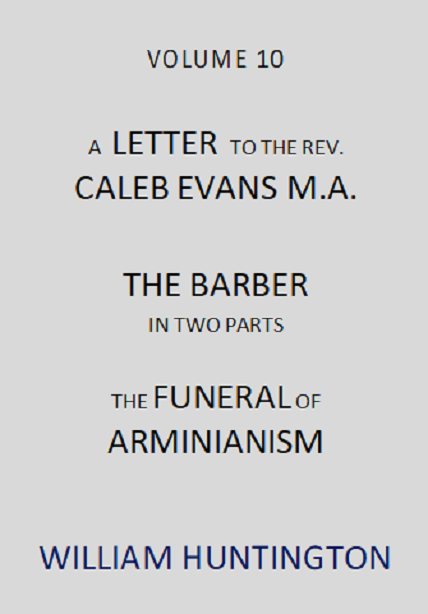By William Huntington.

A Letter to the Rev. Caleb Evans, M.A.
The Barber in Two Parts.
The Funeral of Arminianism.
By William Huntington
About this book:
A Letter to the Rev. Caleb Evans, M.A.
MASTER OF THE SEMINARY AT BRISTOL,
“But there is a spirit in man: and the inspiration of the Almighty giveth them understanding.” JOB 32-8
William Huntington having read and considered the circular letter drawn up by Rev. Caleb Evans, read and approved by the Association met at Horsley, in Gloucestershire, July 3rd and 4th, 1789; and finding myself, and some doctrines which I believe to be true, levelled at; I have presumed to make a few remarks on the performance; and humbly inscribe them to your Name, and submit them to your perusal.
William Huntington conclude at the end of this letter that this circular Letter will never bring glory to God, nor produce any good works in men: nor do I believe that it will ever do honour to the Author
The Barber in two parts
or,
Timothy Priestly Shaved as Reflected from His Own Looking Glass
Addressed in part to Timothy Priestly Himself
William Huntington to Timothy, When first your proposals for printing the Christian’s Magazine were published, the expectations of professors were wound up to a most extravagant height. Many of them expected the mysteries of Heaven to be fathomed, and the wonders of the deep to be discovered; yea, nothing but treasures from your Magazine, both new and old. Your pregnant and fragrant proposals set such an edge on their appetites, that they expected, as soon as your stores were opened, the mysteries of heaven would have been displayed, and the skies would have poured down righteousness.
There was little or nothing to be heard among us, but the expectations of Mr. Priestley’s monthly entertainments. But, alas! alas! instead of a gospel banquet, a feast of fat things, we art put off with nothing but new moon feasts: for, surely, never was a Christian’s Magazine opened that exhibited less spiritual stores, less ammunition and artillery, less force of truth, and less strength of argument, than those published by Timothy Priestley.
Nor do I believe that any, in this age, has confounded the wise, and puzzled the godly, more than he has done; for, after all the numbers that have been published, and read, it may with propriety be said, that eye hath not seen, nor ear heard, neither hath it entered into the heart of any man living to conceive, what Mr. Priestley means nor what those things are that he has laid up in his Magazines for those that buy and read them!
The generality of the wise agree, that he writes neither law nor gospel: he has neither judgment nor experience; it is neither free-will nor free-grace; he displays no wisdom nor wit; it is neither the letter of scripture nor the power of godliness; there is no divine revelation nor sound reason; neither natural religion nor spiritual religion; nor does the author discover either natural abilities or acquired; there is no human learning, nor divine teaching. So that our wise men are all at a loss, and not one at a point.
We all agree that our Author labours; but whether in the flesh, or in the wind, it is hard to tell. He fights, but neither with the sword of the Spirit, nor the sword of war: he heats the air. He sounds; but whether the ram’s horn, or the conch, we cannot as yet find out. He runs; but it is at such an uncertainty, that we are all at a loss to find out his beat, or where his haunt is.
William Huntington follows this with quotes from the magazine and his response.
The Funeral of Arminianism
TO THE REVEREND WILLIAM HUNTINGTON,
Dear Sir,
THE money enclosed is by way of subscription, to defray the expenses of publishing your sermon, preached this morning, which we would beg leave to call “The Funeral of Arminianism.”
Requested by
Yours sincerely, in the Cause of truth
J. BEST,
J. DAVIDSON,
JOHN BRAYNE,
G. TERRY,
J. ALDRIDGE.
Sunday Noon, March 13, 1791
Dear Friends,
I AM willing to comply with your request: but, as the text never struck my mind till last fright going to bed, it could not be supposed that I could be very concise in the delivery of so long a subject; nor can it be expected (as I could not sit down immediately to pen the subject while it was fresh on my mind, but was obliged to preach another discourse before I began to write this) that I can retain, by strength of memory, every particular of a discourse nearly two hours long, so as to express it verbatim as it was delivered. I believe you will have the substance of it, with a little more conciseness or method, and with a good deal less power.
However, I shall confine myself as much as I possibly can to my text. I shall use plain dealing; and, such as it is, I hope you will receive it from one who serves you in Christ Jesus, with as much or more satisfaction than you can express yourselves to be served, by so unworthy a servant as,
WM. HUNTINGTON.